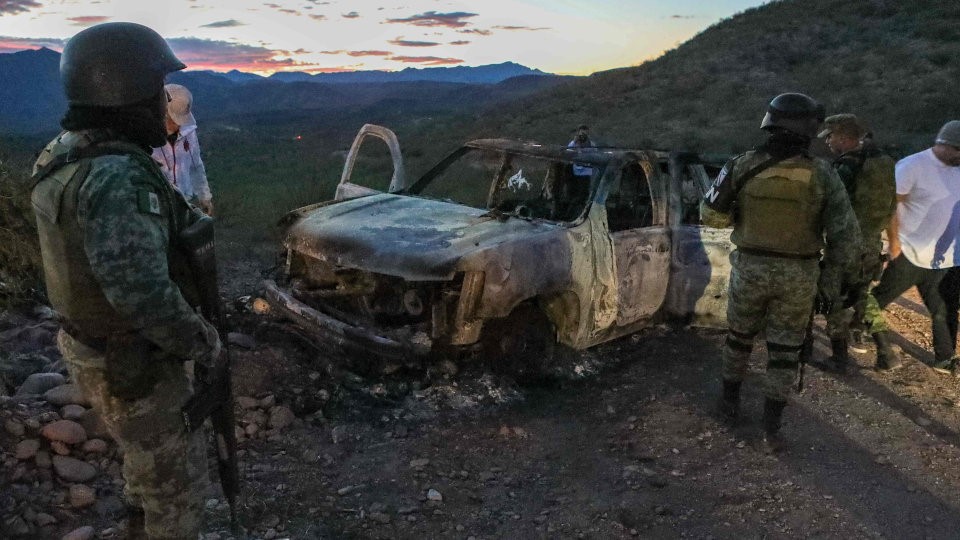On Monday, November 4th, nine members of the LeBaron family – three women and six children (among which were a pair of eight-month-old twins) – were brutally killed in the border region between the Mexican states of Chihuahua and Sonora. The killing has been attributed to cartel violence in the area, however, it is not clear whether the attack was targeted, or rather was the result of confusion on the part of the cartel, who might have believed the attacked vehicles were that of a rival gang. The Mormon family holds dual US-Mexico citizenship and some of its members have been vocal peace activists against drug cartels. This horrifying event comes a few weeks after the city of Culiacán, was virtually taken by the Sinaloa cartel after a botched attempt to capture El Chapo’s son – notorious cartel leader Joaquin Guzmán, now serving a life sentence in the US – by Mexican forces.
Both of these events are the consequences of drug trafficking, a serious problem not only for Latin America but also for the United States. In this system, drugs are mostly produced in Southern and Central American countries and travel through Mexico – which becomes a crucial transit point on the way to North America, and particularly to the US. This organization is exacerbated by relatively recent developments, mainly the signing of NAFTA, which augmented traffic on the US-Mexico border, and the American and Colombian crackdown on drugs, which resulted in a fragmenting of Colombian cartels – leaving a power vacuum for Mexican cartels to fill – and a rise in the difficulty of getting drugs into the US through Florida and the Caribbean, making the border region an even more strategic location.
This phenomenon results in crucial issues for every country involved. The Mexican national murder rate is set to hit 30 per 100,000 people in 2019, which makes this year a record one in recent history. This violence is not only devastating in terms of loss of life, but it is also a huge setback for economic development. The Mexican economy is based on small family businesses, and with 34% of firms having suffered from a criminal attack in 2017, they are forced to limit their development – or even shut down – to avoid problems with local cartels that might ask for a “land tax.” Drug violence, even though present in the last few decades, has risen in a very consequential manner since 2006, year in which Mexican President Felipe Calderón launched a US-backed war on drugs. It has been estimated that around 200,000 lives have been claimed in this conflict. The new president, Andrés Manuel López Obrador, based his campaign on reducing violence in a more peaceful manner and by addressing the root cause through social programs. He summed up his policy as “Abrazos, no balazos”: “Hugging, not shooting.”
Drug trafficking also negatively affects American interests, as the country faces an opioid crisis and a rise of overdoses related to fentanyl (the number of overdoses related to the synthetic opioid tripled from 2015 to 2017), which Mexican cartels happen to be one of the leading manufacturers of. The cooperation between the two countries seems to be essential to resolve this issue, but the tense relationship between the two leaves much to be desired.
We can see this partly in the fact that the LeBaron massacre incited an American response, as the family holds US citizenship. The family emigrated to the north of Mexico at the end of the 19th century to escape anti-polygamy laws in the US. They have since settled in the area while still keeping in touch with their American culture. This goes to show how linked Mexican and American communities are, particularly in the northern states of the country.
However, this response, and especially that of President Trump, opens very fresh wounds and stirs tensions between the two countries. His call “to wage WAR on the drug cartels and wipe them off the face of the earth” was rejected by the Mexican president, and members of the LeBaron family themselves responded by asking President Trump to “Focus on lowering Drug Consumption in U.S. […] Stop the ATF and Gun Law loopholes from systematically injecting high powered assault weapons to Mexico” (Alex LeBaron on twitter). Indeed, the bullets used in the attack have been shown to come from the US, which is the case of many weapons used by Mexican cartels, as they routinely turn to smuggled American guns – Mexico has extremely strict gun laws, and in fact, the only gun store in the country is located on a military base.
The military action Trump has called for is an extremely delicate concept in the context of heavy US influence and intervention in Latin America. Historically, the US has intervened to defend its economic interests and famously backed military dictatorships in Southern America throughout the 1970s. US interference in the fight against drug violence in Mexico risks being a dangerous move that might exacerbate violence even more and come at a huge cost for the Mexican population, which is exhausted from living in fear of cartels.
These tragic events highlight two very important phenomena. Drug trade is characterized by its multi-nationality, and can therefore not be resolved by individual actions. In this case, the system depends on the American demand for drugs and the American supply of weapons. However, the actions that would be needed are likely not be taken, given strained US-Mexico relations. The opposition between Trump, calling for intense military action against cartels, and AMLO, who based his entire presidential run on the idea of amnesty and reconciliation, is likely to block any crucial cooperation efforts.
On top of that, the taking of Culiacán by the Sinaloa cartel as a response to the arrest of El Chapo’s son, and the pressure placed on the Mexican government by the US after the LeBaron massacre can raise the question of government autonomy, as Mexican officials face domestic and foreign pressure. It is also particularly interesting to analyze the importance of the state monopoly of violence in Mexico, and how that concept is breached by cartel violence on a daily basis.
I would like to end by paying my respects to the thousands of victims of drug violence not only in Mexico but across the entire world. A resolution of this violence is urgent.

One of the three vehicles attacked belonging to the LeBaron family. Photo: Herika Martinez/Agence France-Presse
Sources, references, etc;
- CNN Español, “Las últimas noticias sobre el ataque a la familia LeBarón en el norte de México”, CNN, 06/11/2019, accessed on 08/11/2019 at https://cnnespanol.cnn.com/2019/11/06/las-ultimas-noticias-sobre-el-ataque-a-la-familia-lebaron-en-chihuahua-masacre-mormona-muerte-9-ninos-madres/
- Nájar, Alberto. “Operación para capturar a Ovidio Guzmán: cómo ocurrió la fallida detención del hijo de “El Chapo” en Culiacán”, BBC, 31/10/2019, accessed on 08/11/2019 at https://www.bbc.com/mundo/noticias-america-latina-50243661
- Bataillon, Gilles. “Narcotráfico y corrupción: las formas de la violencia en México en el siglo XXI”. Nueva Sociedad, vol nº255 (January-February 2015), accessed 08/11/2019, at https://nuso.org/articulo/narcotrafico-y-corrupcion-las-formas-de-la-violencia-en-mexico-en-el-siglo-xxi/
- Gómez Romero, Luis, “The U.S.-Mexico Drug Trade Is Booming. Here Is Why.”, National Interest, 21/07/2019, accessed on 08/11/2019 at https://nationalinterest.org/blog/buzz/us-mexico-drug-trade-booming-here-why-68237
- Lee, Brianna; Renwick, Danielle; Cara Labrador, Rocio. “Mexico’s Drug War”, Council on Foreign Relations. last updated 22/10/2019, accessed on 08/11/2019, at https://www.cfr.org/backgrounder/mexicos-drug-war
- Corcoran, Patrick. “Why Are More People Being Killed in Mexico in 2019?”, InSight Crime, 08/08/2019, accessed on 08/11/2019 at https://www.insightcrime.org/news/analysis/why-are-more-mexicans-being-killed-2019/
- BBC News Mundo, “México: los grandes costos para la economía del país de la delincuencia y el crimen organizado”, 18/01/2019, accessed on 08/11/2019 at https://www.bbc.com/mundo/noticias-46813511
- National Institute on drug abuse, “Overdose Death Rates”, accessed 08/11/2019, at https://www.drugabuse.gov/related-topics/trends-statistics/overdose-death-rates
- Janzen, Rebecca. “Mormons in Mexico: A brief history of polygamy, cartel violence and faith”, The Conversation, 06/11/2018, accessed on 08/11/2019 at http://theconversation.com/mormons-in-mexico-a-brief-history-of-polygamy-cartel-violence-and-faith-126493
- McLaughlin, Kelly. “More than a hundred years ago, Mormons — including Mitt Romney’s family — fled to Mexico so they could practice polygamy. They’ve been plagued by cartel violence, infighting, and murder ever since.” Insider, 05/11/2019, accessed on 08/11/2019 at https://www.insider.com/mormon-church-mexico-history-polygamy-lebaron-la-mora-2019-11
- Sheridan, Mary Beth. “Mormon killings: Mexico’s López Obrador rejects U.S. suggestion he get more aggressive against violence”, The Washington Post, 06/11/2019, accessed on 08/11/2019 at https://www.washingtonpost.com/world/the_americas/mexico-mormon-killings-lopez-obrador-rejects-us-suggestion-he-adopt-more-aggressive-security-policies/2019/11/06/4d966c1e-000f-11ea-8341-cc3dce52e7de_story.html
- El Diario, “La dura respuesta de un LeBarón a Trump tras masacre de miembros de su familia”, 05/11/2019, accessed on 08/11/2019, at https://eldiariony.com/2019/11/05/la-dura-respuesta-de-un-lebaron-a-trump-tras-masacre-de-miembros-de-su-familia/
- People’s World, “Before Venezuela: The long history of U.S. intervention in Latin America”, People’s world, 25/01/2019, accessed on 08/11/2019 at https://www.peoplesworld.org/article/before-venezuela-the-long-history-of-u-s-intervention-in-latin-america/
Other posts that may interest you:
- The Trouble with ‘Ecocide’
- Carbon dioxide removal – hit or miss?
- Local Victories for Turkish Opposition — A Sign of Hope?
- Are France and Japan a Mismatch Made in Heaven?
- A Reflection on Dark Tourism
Discover more from The Sundial Press
Subscribe to get the latest posts sent to your email.




